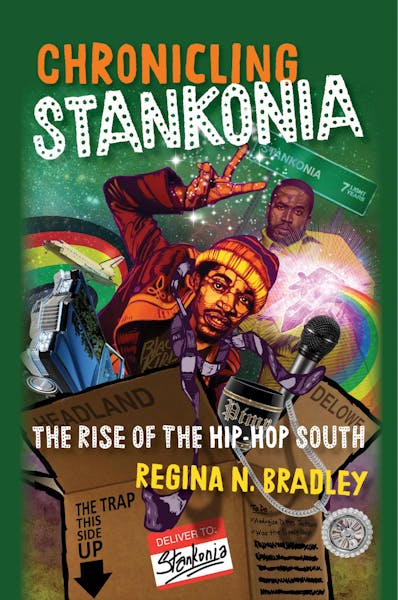
The Virginia Festival of the Book — one of the first major programs in Charlottesville to be canceled due to the coronavirus last year — has returned this year with an all-virtual set of events. This year’s extended festival, which kicked off March 13 and runs until March 26, is an online cornucopia of free programming for readers, writers and all manner of book enthusiasts.
On Monday, a discussion called Reading Under the Influence: Music, History & Race convened three scholars whose recent works track how blues, southern hip-hop and late-century gospel music show the multi-dimensional history of Black musical traditions in America — Regina Bradley, Adam Gussow and Claudrena Harold. The panel was moderated by Matthew Morrison, an assistant professor at New York University’s Tisch School of the Arts.
Morrison asked each of the panelists to first describe how their projects emerged, and who they consider the book to be for, before each panelist read a selection from their work. Harold, a professor of African American and African Studies and History at the University, first read from “When Sunday Comes: Gospel Music in the Soul and Hip-Hop Eras.” Bradley, an English professor at Kennesaw State University, then read from her book “Chronicling Stankonia: The Rise of the Hip-Hop South,” followed by Gussow, a professor of English and Southern Studies at the University of Mississippi, who chose a selection from his book, “Whose Blues? Facing Up to Race and the Future of the Music.”
As Morrison and the panelists recognized, an hour-long panel would be insufficient to tackle the subject of even one of the musical genres or movements studied by the scholars, let alone all three. However, through their introductions and readings, attendees got a sense of what would be the major themes of the night — upholding Black musical traditions, refusing to identify Black music or culture as monolithic and reclaiming space through telling stories.
The panelists’ enthusiasm and care for their subject matter came through in the testimony and thoughtful responses they gave to questions asked by Morrison and through the audience Q&A function on Zoom. The authors were also able to interact and speak with each other despite the virtual format. In one instance, Gussow discussed his attempts to understand Zora Neale Hurston’s relation to the blues, and her deliberate positioning of Black female characters in spaces like juke joints. Bradley accepted Gussow’s suggestion and expanded on it, adding context as a southern Black woman and scholar.
“What I saw Hurston doing was reclaiming space that was being taken away from her in a larger landscape,” Bradley said. “Especially in the early 20th century, folks were trying to present the American south as a place you had to escape. It wasn’t necessarily a place of complexity, it wasn’t a place that held joy. So here comes Zora Neale Hurston, whose intention is to tell these stories from the complex perspective that they have to be afforded.”
Bradley related Hurston’s efforts to contemporary Black women and girls’ relationship with hip-hop. By enjoying or creating hip-hop, southern Black women in particular could speak their truths and escape the constriction of having to conform to perfection as a reflection on generations before and after them.
“[Hip-hop] picks up on the messiness of existing as southern and Black that Hurston and blues women take up in the 20th century … it’s like a sonic genealogy of storytelling.”
Tracing the history between Black musical innovation and exploration cannot be done with a single line, but Harold and the other scholars made connections between their work and the music they love throughout the discussion. Currents of liberation, frustration and generational anxiety run through the history, particularly in the post-Civil Rights era, where continued systemic racism against Black people has proved — to borrow from Bradley’s reading — “Dr. King’s mountaintop certainly was not flat.”
Harold commented on these issues as well, along with providing nuance in how Black people have sought a variety of explanations, theological and otherwise, for modern and contemporary struggles. Debates about “authentic Blackness,” she said, only limit these explorations into the history of race and music.
Morrison also prompted the panelists to discuss the idea of the sacred and the secular in Black musical traditions. Harold argued that the elasticity of gospel music allows for it to be heard in a variety of genres. She highlighted blues artist B.B. King’s song “I Like to Live the Love,” which she noted was written by her uncle.
“When he says, ‘My song is a serious matter / It reflects how I feel,’ that is Saint Matthew’s Baptist Church, Northside Jacksonville,” Harold said.
King’s assertion in those first lines illustrates the critical relationship of individuals and communities with music and song and storytelling. Ownership, emotion and affirmation are empowering on personal levels and in shared faith and can be seen in music created by and for Black communities across genres and history.
“The first time I heard Outkast was a profoundly spiritual experience,” Harold said. “I think what Black people are trying to grapple with, whether it’s Outkast or Yolanda Adams, is how are we human in the world? And how do you maintain faith? How do you maintain your humanity?”
The evening ended with 30 minutes of a live-streamed porch performance from Gussow and Alan Gross, who together make up the group The Blues Doctors. Listening to the two men groove provided a space for reflection, contemplation and appreciation for a layered and complex history of musical creation.
The all-virtual Festival of the Book continues with free events through March 26. A full list of events and registration information can be found at vabookfest.org.
from WordPress https://ift.tt/3s6D1W1
via IFTTT






No comments:
Post a Comment